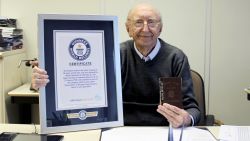Failure isn’t the first thing that comes to mind when you think about success. But it’s a vital part of advancing your career, and something that should be embraced.
Whether it’s getting terminated or making a bad business decision, failure doesn’t have to be a career ender.
Getting fired

John Tarnoff spent decades in Hollywood as an agent, producer and in executive leadership roles. During his 35-year career in the entertainment and tech industries, he was fired fromseven jobs.
The first time Tarnoff was fired, he knew it was coming. He was 30 and was working in production for MGM studios. A new executive came in and Tarnoff was no longer needed.
“I was basically waiting for the call. It was very civilized,” he recalled. “We didn’t have the same chemistry, I didn’t feel like there was a click there.”
Tarnoff found a new job about a month later. And he continued to work in the industry, despite getting fired six more times.
Tarnoff says that churn is common in the industry, and being let go often comes with the territory. “People get fired in the entertainment industry at a higher rate when they’re in positions that are subject to the volatility in the marketplace — audience tastes change, timing is everything, the zeitgeist is always shifting.”
He learned how to pivot quickly from each termination.
“Lean into it. It’s OK. You will survive. Getting fired is not fatal. You will learn a lot of lessons and you will be a more valuable professional because of the failure and lessons you have learned,” he said.
One thing Tarnoff learned was that it wasn’t his resume that helped get him a job — it was his networking efforts.
“You should always be networking,” he said. “I never used my resume to get a job, it was always a ‘send it over so we have it on file’ request, not because they actually wanted to look at it.”
He also realized that while some people will spend their entire careers with one or two companies or within the same industry, that wasn’t his path.
“My destiny is to be an explorer,” Tarnoff said. “I get bored easily.”
He took a break from Hollywood to start an internet startup in 1996. He’s now a career coach for baby boomers seeking new career opportunities and recently wrote a book about it called “Boomer Reinvention: How to Create Your Dream Career Over 50.”
Getting rejected

Tomer London failed many times before he co-founded Gusto, a payroll, benefits and human resources company in San Francisco that now serves more than 60,000 businesses.
Growing up in Israel, London started coding as a teenager. His plan was to join a technology unit in the Israeli army when he joined at age 18, so he studied hard for the tests for three different units. He failed every one.
“That was probably the toughest failure for me. It was very early and I thought this would mean I wouldn’t be able to get into technology and I always knew I wanted to do that,” he said.
Instead, he joined the combat unit as a soldier in the air force for three years. It turned out to be a good move. “Looking back, I feel like some of my best friends are people I met in the service.”
He later started a tech company called Vizmo that built call center technology. But that company was shutteredwithin a few years after it failed to land an anticipated big customer and ran out of money.
After Vizmo failed, he applied for a job at Google and failed to get a follow-up interview.
But London calls the Google (GOOG) rejection “the luckiest rejection email I’ve ever received.” After he didn’t land the interview he decided to apply to Stanford,where he met his two Gusto co-founders.
“It’s not about thinking failure is fun. It’s not. It sucks,” he said. “But it’s knowing it’s part of the game, and you need to keep improving. It’s better than just sitting on the sidelines and just watching.”
Making the wrong business decision

In 2015, the founders of sock and undergarment brand Richer Poorer got an unsolicited $12 million acquisition bid from Shoes.com. The company was growing rapidly and was looking to build a strong digital presence so the deal seemed to make sense.
“They had everything we were looking for on paper,” said Tim Morse, who along with Iva Pawling, founded the company in 2010.
The marriage didn’t last long.
Less than a year after the purchase, Morse started hearing rumblings that Shoes.com was having financial issues.
“They brought in a new president, who is still a mentor and friend, and he sat down with us and told us the company wasn’t in the best shape and that they burned through tens of millions of dollars,” recalled Morse.
Morse and Pawling started mulling their options. “We didn’t want to get sucked down with it,” he said. The pair, along with two members of the board, bought the company back for $8 million in 2016.
“The first thing we thought about were our employees,” Morse said. “We are responsible for mothers and fathers and families so that was our first mission: How do we pull this thing out of the fire and save it before the house burns down?”
While Morse said thatthe $12 million sale price was likely a premium, at the end of the day, it wasn’t the right move for the business.
“The lesson learned is that if things seem too good to be true, they typically are,” said Morse. “No one knows your business better than you.”

























